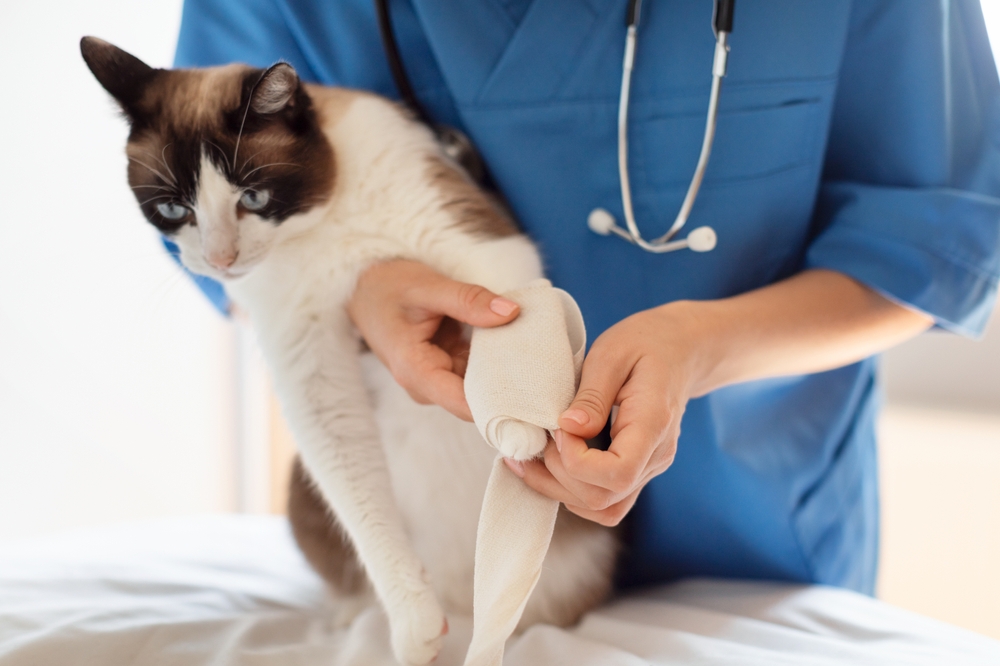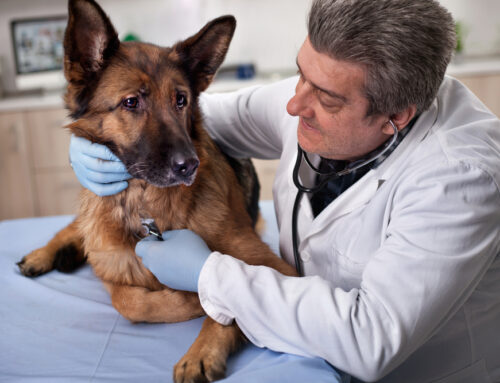When your pet becomes ill or injured, you may want to rush them immediately to the nearest veterinary hospital. However, although no one likes to see their four-legged friend in distress, not all situations warrant emergency care. Determining the type of care your pet requires can be tricky, but the main difference between urgent and emergency care is whether the situation is life-threatening. Read our Guam Pet Hospital team’s guide that describes common conditions in pets, and whether they require emergency veterinary care or urgent care.
Difficulty breathing in pets
Breathing difficulties can develop without warning and rapidly worsen. Monitor your pet closely for breathing difficulties.
Urgent care: If your pet is having difficulty breathing, such as wheezing or coughing, they require urgent care. These signs may indicate respiratory distress or an obstructed airway.
Emergency care: If your pet is unable to breathe, has a blue tongue and gums, or loses consciousness, they need emergency care. Perform cardiopulmonary resuscitation (CPR) if necessary and rush your pet to the nearest veterinary hospital immediately.
Lethargy or weakness in pets
While a long day of play or an intense exercise session can leave your pet feeling sluggish and worn out, ongoing weakness is concerning. If your pet has been lethargic for more than a day, they likely need veterinary care.
Urgent care: If your pet is unusually lethargic or weak, various underlying issues, such as dehydration, anemia, infection, or organ failure, could be the reason. Prompt veterinary evaluation is necessary to determine the cause.
Emergency care: If your pet is unable to stand, appears disoriented, or collapses, they are experiencing an emergency. Carry your pet to the car and head to the nearest veterinary hospital without delay.
Vomiting or diarrhea in pets
Occasional vomiting or diarrhea may not be cause for immediate concern, especially if your pet is otherwise behaving normally. However, if your pet is experiencing vomiting or diarrhea frequently for more than a day, schedule a veterinary visit.
Urgent care: Persistent vomiting or diarrhea, especially if accompanied by lethargy, dehydration, or blood in the stool or vomit, requires urgent veterinary care.
Emergency care: If your pet is vomiting or having diarrhea frequently and uncontrollably, or if they show severe dehydration signs, such as excessive lethargy, sunken eyes, and dry gums, seek emergency veterinary attention.
Difficulty urinating in pets
While a urinary tract infection (UTI) can cause considerable discomfort, the condition is not life-threatening unless it progresses to a urethral blockage. Urinary problems can become severe quickly, so if your pet is exhibiting discomfort signs, call our team.
Urgent care: Straining or crying while urinating, frequent attempts to urinate with little to no output, or blood in the urine indicate potential urinary tract issues. Contact Dr. Bob promptly for evaluation.
Emergency care: If your pet is unable to urinate, they may have a life-threatening urinary obstruction. Male cats are especially prone to urinary obstruction. Rush to the veterinary hospital immediately if your pet is unable to urinate.
Bleeding in pets
Pets can get into all manner of trouble that results in a wound. Minor cuts or scrapes may only require first aid at home, but serious injuries need professional treatment.
Urgent care: Significant bleeding that doesn’t stop with gentle pressure, deep wounds, or bleeding from the mouth, nose, or rectum should receive urgent veterinary attention.
Emergency care: Profuse bleeding, bleeding that will not stop, or bleeding accompanied by shock signs, such as pale gums, rapid heartbeat, and shallow breathing, constitute an emergency. Apply pressure to the wound and head to the nearest veterinary hospital immediately.
Seizures in pets
Witnessing your pet have a seizure can be a frightening experience. However, by staying calm, you help ensure your four-legged friend receives proper care.
Urgent care: If your pet has been diagnosed with epilepsy and is on medication, they may not require care if they experience a seizure. However, if this is your pet’s first seizure, seek veterinary care to ensure nothing is amiss.
Emergency care: A grand mal seizure constitutes an emergency, especially if seizure activity is prolonged or turns into a cluster of seizures. Ensure your pet’s safety by removing nearby objects, staying calm, and avoiding restraint during the seizure. Once the seizure subsides, seek immediate veterinary attention.
These situations are always a veterinary emergency

Although some illnesses do not pose an immediate threat to a pet’s life, other conditions require immediate emergency veterinary care. Bring your pet to the nearest veterinary hospital if they experience any of the following conditions:
- Heatstroke — Heatstroke in pets is always an emergency, as immediate action must be taken to safely cool down the affected pet to prevent organ damage. If your furry friend appears to be suffering from heatstroke (e.g., drooling, rapid heartbeat, vomiting, collapse), cool them down immediately by moving them to a shaded area, pouring tepid—not cold—water over their body, and seeking emergency veterinary care.
- Toxicity — If you suspect your pet has ingested a toxic substance, such as human medications, household chemicals, poisonous plants, or certain foods, including chocolate, grapes, or onions, seek emergency veterinary care immediately. Time is critical in these situations, and prompt treatment can make a significant difference in your pet’s outcome.
- Birthing difficulties — If your pregnant pet is having difficulty delivering puppies or kittens, seek emergency veterinary care. Prolonged labor or birthing difficulties can endanger the mother and her offspring, so don’t delay if you are concerned about your pet during labor.
Always trust your instincts and err on the side of caution when considering your pet’s health. If you’re unsure whether your pet requires urgent or emergency care, contact our Guam Pet Hospital team for guidance. Being prepared and proactive can help ensure the best possible outcome for your furry friend.








Leave A Comment